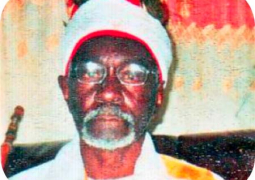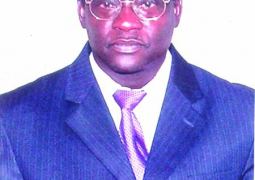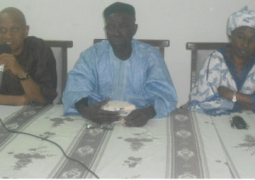The launching of the single currency for the West African Monetary Zone (WAMZ) has again been postponed to 1 January 2015, making it the third postponement since ECOWAS member states of the zone decided to form a single currency for the region.
The Gambia has however continued to express its commitment to the realization of the monetary cooperation programme, as it has been one of the leading countries that have adopted and ratified most of the WAMZ instruments and on course in the implementation of the Roadmap of the Abuja Action Plan necessary for the launching of the single currency.
This positioned was made clear on 17 January 2014 by Gambia’s Trade Minister Abdou Kolley and Vice President Dr Isatou Njie-Saidy in their all-important statements delivered on behalf of President Yahya Jammeh at the end of the Joint Extraordinary Meeting of the ECOWAS Convergence Council and the 33rd WAMZ Convergence Council Meeting held at the Kairaba Beach Hotel from 10 to 17 January.
The meetings brought together finance ministers and central bank governors of member countries as well as officials and representatives from the West African Monetary Agency (WAMA), the West African Monetary Institute (WAMI), IMF and other international bodies.
One of the major challenges confronted by member states is the difficulty to improve and sustain their performances on the convergence criteria.
Although progress has been made in the first half of 2013, most countries achieved two out of four of the convergence criteria with “the exception of Nigeria which met all four criteria and three out of the six secondary criteria”.
“The founding fathers [of the Economic Community of West African States (ECOWAS)] made a strong case for an urgent need to liberalise trade with the ultimate goal of complete integration and prioritized development of transportation and communications to facilitate the free movement of people and goods,” Vice President Njie-Saidy recounted in delivering President Jammeh’s statement to the august gathering.
She continued: “The full integration envisaged is yet to be realized. In fact, the road to the establishment of the zone has been disappointingly slow and halting. The commencement date for second monetary union has been postponed thrice in 2003, 2005 and 2009.
“You can recall that in May 2005, the Heads of State and Government of the WAMZ met in and at this magnificent edifice outlined an action plan aimed at deepening and sustaining the integration process, a la the Banjul Declaration. A new date of December 2009 was announced for the commencement of the project. In addition to satisfying the quantitative convergence criteria, Member States made a commitment to establish a single economic space. At that Banjul meeting, I challenged the member countries of the WAMZ to cast aside the clouds of evil of wars and forge a new path to sustained peace and prosperity. I also urged that given that our economies are fragmented and small and therefore at the mercy of globalization, prosperity is best achieved if we pull our resources together.
The statement by President Jammeh continues: “As long as Africa has many states with close borders, the continent would continue to punch below her weight. In addition, I underscored that monetary union is the best vehicle to foster greater integration and trade and by creating a strong and dynamic sub-regional body, it could serve as a building block towards greater continent wide integration.”
Before the postponement of the launch of the single currency project in 2009, there was optimism that the initiative would come into fruition but this is yet a dream.
The Vice President continued: “However, this optimism was dashed by the global food and energy price shocks and then by the financial crisis. The attendant slowdown in the global economy made it difficult for countries in the zone to consistently observe the convergence criteria.
“This caused the Authority of Heads of State and Government to once again postpone the launch of the Project to on or before January 2015 to give countries more time to carry out the necessary reforms to meet the convergence criteria sustainably.
“But shockingly as it sounds, failure can be a good thing if it strengthens our resolve to religiously observe the convergence criteria, the rock on which monetary union is built.
VP Njie-Saidy said as the WAMZ member countries endeavour to put the Project on a firmer footing, it is vital that they work harder and together and adhere to the precepts of sound economic management to improve member countries’ defences against external shocks.
History has taught us that creating a credible monetary union is a process, not an event, the Vice President also noted, saying: “We should, therefore, be under no illusion about how difficult it would be to establish a well-functioned WAMZ.
“To get to our destination, we need great courage and determination and to learn key lessons from the European Union.
“Europe’s single currency is by no means a disaster as some pundits may want us believe. It has met its main goal of price stability. Yet if the troubles in Greece, Ireland and the other small euro zone countries have taught us lessons, It is that: (i) Sustained convergence is the rock on which monetary union is built; (ii) tough fiscal rules are necessary to lay the ground for a homogenous fiscal zone; (iii) a permanent funding mechanism contributed by members is needed to help countries access finance if they cannot source it from the market; and (iv) national prioritization of regional economic integration is vital.
“This must not only come from the Government but from the private sector and the business leaders as well who already measure opportunities and know that’s economies of scale, which is best achieved through integration, is not only critical to economic development but is good for business.”
She reiterated Gambia’s commitment to the project, saying: “The Gambia remains resolute and steadfast in the pursuit of economic and financial stability. Under the Extended Credit Facility (ECF) agreed with the International Monetary Union Fund (IMF) and cognizant of our obligations under the WAMZ, fiscal and monetary policy would follow a prudent course.
“Reforms are, therefore, focused on increasing revenue through better administration, improving the efficiency of spending and enhancing the conduct of monetary policy and financial sector supervision to improve the environment to boost credit to the private sector.
“I would like to take this opportunity to reaffirm to this august meeting that my Government would continue to provide unflinching political support to the WAMZ project and the ECOWAS-wide integration program and to take necessary and appropriate measures to succeed.
“I urge all the member countries to make a similar undertaking. I understand that creating a vast open zone could be unsettling and sometimes provokes fierce opposition. But integration is critical for the rapid development of the region.”
This statement by the Vice President delivered on behalf of President Yahya Jammeh, brings to light what the late Pan-Africanist President Dr Kwame Nkrumah states in one of his books - Neo-Colonialism: The Last Stage of Imperialism – that: “In the process of obtaining economic unity there is bound to be much hard bargaining between the various states. Integration of different aspects of economic policy will proceed at different rates, and there may be disappointing delays and compromises to be worked out. But given the will to succeed, difficulties can be resolved.
“With economic unity … We would all be in a better bargaining position to obtain higher prices for our goods and to establish adequate taxation of foreign factor earnings.”




